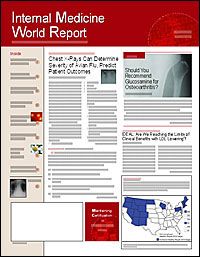Publication
Article
Internal Medicine World Report
Developing Heparin Antibodies in Cardiac Surgery Is Common, Resulting in Poor Postop Outcomes
From the American College of Chest Physicians
Montreal—The presence of antibodies to heparin is an independent risk factor for potentially serious complications after cardiac surgery, said David Kress, MD, at the 71st international scientific assembly of the American College of Chest Physicians.
Even patients who do not develop heparin-induced thrombocytopenia (HIT) were at increased risk of postoperative complications if they tested positive for heparin/platelet factor 4 (HPF4) antibodies.
The clinical risk associated with HPF4 antibodies in patients who do not have HIT is poorly understood in clinical practice, said Dr Kress, senior cardiothoracic surgeon, Aurora St. Luke’s Medical Center, Milwaukee, Wis.
Using the Society of Thoracic Surgeons National Adult Cardiac Surgery Database, he evaluated post­operative outcomes of 1114 consecutive patients undergoing coronary artery bypass grafting and/or valve surgery who were screened in an unselected manner for HPF4 antibody status over 2.5 years at a single surgical service.
A total of 60 of the 1114 (5.4%) patients tested had positive HPF4 antibodies preoperatively.
Outcomes in the HPF4 antibody-positive versus - negative patients were:
• A greater incidence of acute limb ischemia (5.0% vs 0.9%; P = .03)
• A greater incidence of renal dialysis (11.7% vs 4.3%; P = .02)
• A greater incidence of gastrointestinal complications (15.0% vs 5.7%; P = .01)
• A greater incidence of prolonged mechanical ventilation >96 hours (21.7% vs 8.8%; P = .01)
• Longer median intensive care unit length of stay (LOS) (56 vs 42 hr; P <.05)
• Longer median postoperative LOS (9 vs 7 days; P <.01)
HPF4 antibodies typically indicate that a patient has had past exposure to heparin and is at greater risk for developing HIT, a life-threatening immune-mediated complication of heparin administration that contraindicates further heparin exposure.
“The thing that’s different about our study is that it looks at a syndrome of having positive antibodies that is not HIT,” said Dr Kress. “We found that whether the patients developed thrombocytopenia postoperatively had no further effect on the postoperative morbidity. It was the presence of the antibodies that appeared to be related to it. Most studies looking at complications of heparin only look at HIT. This syndrome that we’re talking about is almost an entirely different disease than HIT. And it hasn’t been ­discussed much in the literature up to this point.”
HIT syndrome occurs in about 3% of patients undergoing cardiac surgery, and overt thrombosis occurs in 50% of HIT patients. Clinical consequences of HIT include limb ischemia requiring amputation, myocardial infarction, stroke, pulmonary embolism, and death.
According to Dr Kress, optimal preoperative care for cardiac surgery patients should include screening for HPF4 antibody status. Diagnostic and therapeutic methods to identify and minimize the development of HPF4 antibodies during cardiac surgery may be important for reducing risk in the overall cardiac surgery patient population.
Positive HPF4 antibody status was an independent predictor for adverse outcome by stepwise logistic regression analysis and was associated with a higher risk for renal failure requiring dialysis than diabetes, a higher risk for prolonged mechanical ventilation or gastrointestinal complications than a ventricular ejection fraction <35%, and a higher risk of acute limb ischemia than peripheral vascular disease.
“In the future, there’s a very good chance that heparin alternatives will come out which are safe and effective for bypass surgery, and ultimately we may want to use something other than heparin and just avoid the whole problem,” said Dr Kress. Bivalirudin (Angiomax) is a short-acting thrombin inhibitor in late-phase clinical trials that appears to have many of the properties of heparin but is not antigenic the way that heparin is.
“Heparin is a very easy drug to use and it’s inexpensive. What surgeons may do is check for the HPF4 antibody, and if it’s present, then use a heparin alternative,” he said. “That’s probably the way most surgeons will go.”
The development of HPF4 antibodies will be more frequent, he predicted, because many patients coming to surgery have had previous percutaneous coronary interventions with heparin exposure.—W.K.





